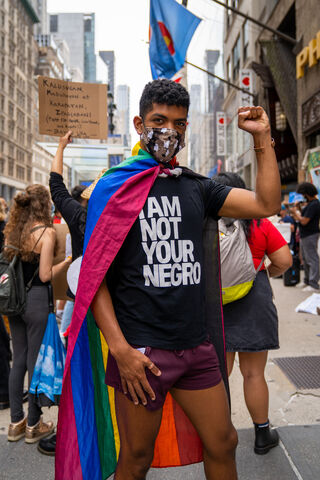Bias
How to Externalize Oppression
Combating impostor phenomenon, colonial mentality, and internalized oppression.
Posted April 18, 2022 Reviewed by Michelle Quirk
Key points
- Internalized oppression has been linked to negative mental health issues such as depression and low self-esteem.
- Internalized oppression can manifest through impostor phenomenon, colonial mentality, and more.
- Externalizing oppression can result in better health outcomes and longer life expectancy.
Through my work as an educator, clinician, and researcher, I’ve learned that many people struggle with internalized oppression, or the process of maintaining negative beliefs about oneself or one’s identity groups. Because people of historically marginalized groups (people of color, women, LGBTQ people, people with disabilities, etc.) are socialized with so many deprecating messages about their groups, they may easily learn and hold onto negative thoughts and feelings about themselves.

Internalized oppression can manifest in multiple ways, often beginning in childhood. For example, some people of color may dislike their physical appearance (e.g., their skin color, eye shape, or hair texture), especially when they are heavily exposed to whiteness through the media, their peer groups, and their educational settings. Similarly, when girls are taught, implicitly or explicitly, that women are not capable or successful in certain fields (e.g., math, sciences, professional sports), they may develop beliefs that those career options or fields are out of their reach. Furthermore, when LGBTQ people are taught they are immoral, abnormal, or unworthy—because of their sexual orientations or gender identities—they may normalize heterosexuality and cisgenderism, or even find themselves incapable of love.
Imposter Phenomenon
The impostor phenomenon (frequently labeled “impostor syndrome”) is one manifestation of internalized oppression; it can be described as the process in which people doubt their own intellect or physical capabilities—despite prior experiences or data that demonstrate otherwise.
For instance, people of color who find success may internally believe they are unworthy of their high-paying jobs, may feel that they are not as smart as their peers, or may experience anxiety when performing simple tasks. Some people who struggle with impostor phenomenon report a fear of being “found out”—as if their hard work and qualifications were falsified or unearned—hence, they feel like "impostors." People with intersectional identities (e.g., women of color, LGBTQ people of color) may learn layered messages about their identities, resulting in increased self-doubt and anxiety.
Colonial Mentality
Second, what's known as colonial mentality is a form of internalized oppression in which people of colonized groups learn to value and celebrate the norms and standards of the colonized group while devaluing and negating the norms and standards of the colonized.
As an example, Dr. EJ David has written extensively about colonial mentality and Filipino Americans. As the Philippines was colonized by both Spain and the United States (for more than 400 years cumulatively), the people of the Philippines were socialized with both Spanish and American colonizers’ standards of beauty, languages, religious values, and other practices and behaviors. Meanwhile, many learned to devalue, dismiss, or discriminate against those same qualities from pre-colonized or indigenous groups of the Philippines. Colonial mentality may affect people on unconscious levels; for instance, some Filipino Americans may be proud of their ethnic identities and communities while concurrently having implicit desires for lighter skin or denigrating peers who speak with Filipino accents.
Research has found that internalized oppression can have detrimental impacts on mental health and behaviors, self-esteem, and more. For example, one study revealed a link between internalized racism and low self-esteem, particularly for people of color who report depressive symptoms. Another study found that women with internalized misogyny report increased psychological distress, especially after encountering sexism. One study supported how internalized homophobia significantly increases relationship conflict and decreases relationship quality within same-sex couples, especially when faced with external stressors. One study with Black women described how race- and gender-based discrimination can increase both levels of impostor phenomenon and negative mental health outcomes. Finally, studies on Filipino Americans have illuminated how increased levels of colonial mentality may result in less psychological flexibility and decreased mental health help-seeking behaviors.

Externalizing Oppression
One way to combat internalized oppression is for individuals to externalize oppression— especially when encountering systemic or interpersonal discrimination. So, instead of holding onto negative feelings like guilt, shame, or blame (i.e., common traits of internalized oppression), externalizing oppression means first recognizing the roles of systems, institutions, and other individuals’ biases in those discriminatory interactions, and then holding those entities accountable.
The benefits of externalizing oppression have been empirically supported by preliminary research. One study indicated that Black Americans who externalize racism are likely to live longer and report better health. Another study found that Black men who maintain pro-Black attitudes when faced with racial discrimination are less likely to be at risk for hypertension, as compared to Black men with implicit anti-Black attitudes who are at risk for hypertension when encountering racial discrimination. Taken together, these studies demonstrate how externalizing racism can help Black people (and possibly other people of color) live healthier lives.
While more research is needed to understand how externalizing oppression can affect various groups, it would be crucial to identify, develop, and practice strategies to assist people (e.g., children, students, psychotherapy clients) in these processes. Thus, to jumpstart conversations about externalizing oppression—which hopefully can occur in families, classrooms, therapy rooms, and more—I humbly offer some recommendations:
- Identify and name feelings of internalized oppression. If you experience discrimination or exclusion (and react with doubt, guilt, blame, or other negative feelings), hypothesize how those feelings could be linked to internalized messages you had learned about your identities or social groups. From there, naming how external factors (systems, media, other people, etc.) influence those feelings may assist you in understanding how the oppression is out of your control (and, hence, not your fault). Without naming and externalizing these thoughts or feelings, they might settle, ruminate, or take over your consciousness. And, because self-doubt and gaslighting are effective tools of oppression and colonialism, trust yourself and your instincts.
- Talk about feelings of internalized oppression with others. Discuss feelings like impostor phenomenon or colonial mentality with loved ones, preferably as soon as you consciously connect with them. In hearing feedback or validation from people you trust, you might intellectually and emotionally connect to the necessary data to recognize how other entities should be held accountable for their roles in perpetuating oppression. If you are in psychotherapy or seek other interpersonal forms of healing, giving yourself space to unpack these processes can be useful in both your healing and growth.
- Read and learn more about internalized oppression. Decades ago, there were limited resources that normalized the experiences of historically marginalized groups. Today, there are books, research studies, social media accounts, blogs, podcasts, and other media that can assist in validating people’s experiences—especially their reactions to the harms of systemic discrimination, microaggressions, hate violence, and other forms of oppression. Take advantage of those resources, and remind yourself that you are not alone.
- Initiate conversations on externalizing oppression with others. When you become better at externalizing oppression, consider teaching others how to engage in such behavior, too. Be the person who validates others on their reactions to microaggressions, or be the one who assists them in moving beyond their self-doubts or self-blame. The sooner that people of historically marginalized groups learn about the negative effects of impostor phenomenon, colonial mentality, and other internalized oppression, the sooner they could be on their journey to self-discovery and radical healing too.
To conclude, combating internalized oppression is not an easy task. For some, it means challenging and disrupting decades of debilitating socialized schemas. It might mean recognizing the harm caused by many (or all) sectors of one’s life (e.g., families, schools, religious and ethnic groups) and navigating acceptance and forgiveness. It also means working together with others to fight against both the individual internalized messages and the societal messages that have tormented whole generations and communities. And, while not easy, acknowledging the problem and strategizing how to overcome that problem, can be the first step to self-love, freedom, healing, and justice.
References
David, E. J. R. (Ed.). (2013). Internalized oppression: The psychology of marginalized groups. Springer Publishing Company.
Nadal, K. L., King, R., Sissoko, D. G., Floyd, N., & Hines, D. (2021). The legacies of systemic and internalized oppression: Experiences of microaggressions, imposter phenomenon, and stereotype threat on historically marginalized groups. New Ideas in Psychology, 63, 1-9.




